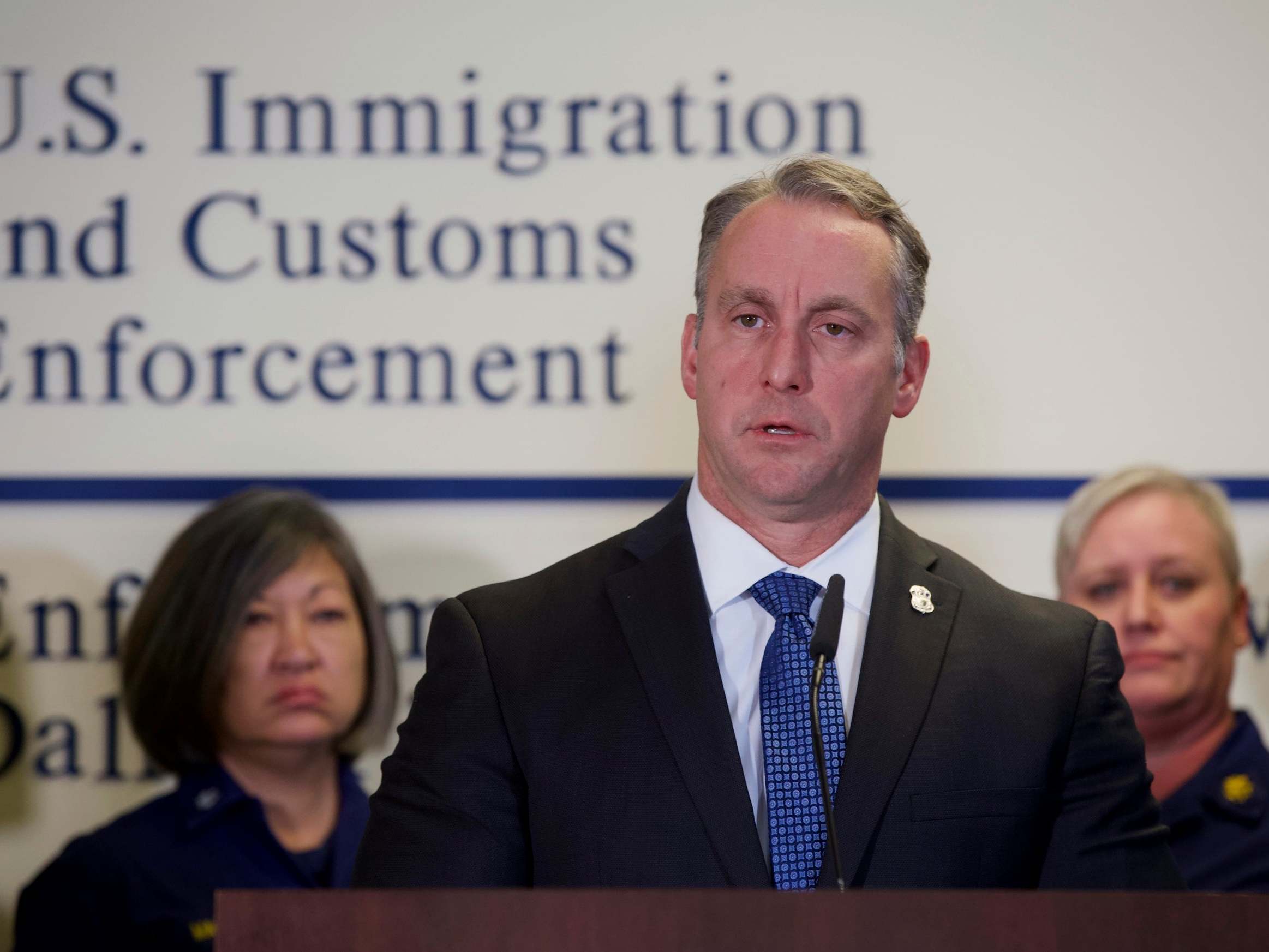US immigration agency deported 12,000 family members and unaccompanied children in one year, new statistics show
Acting director says family operation is ‘just the beginning’
Your support helps us to tell the story
From reproductive rights to climate change to Big Tech, The Independent is on the ground when the story is developing. Whether it's investigating the financials of Elon Musk's pro-Trump PAC or producing our latest documentary, 'The A Word', which shines a light on the American women fighting for reproductive rights, we know how important it is to parse out the facts from the messaging.
At such a critical moment in US history, we need reporters on the ground. Your donation allows us to keep sending journalists to speak to both sides of the story.
The Independent is trusted by Americans across the entire political spectrum. And unlike many other quality news outlets, we choose not to lock Americans out of our reporting and analysis with paywalls. We believe quality journalism should be available to everyone, paid for by those who can afford it.
Your support makes all the difference.US immigration officials deported approximately 12,000 family members and unaccompanied minors last fiscal year, far fewer than the “millions” the US president, Donald Trump, pledged to arrest months ago in frustration about rising border crossings, according to a federal report.
US Immigration and Customs Enforcement (ICE) deported 5,702 family members, a 110 per cent jump from the prior year, which covers the period from 1 October, 2018 to 30 September 2019.
Its year-end report also shows officials deported 6,351 people who crossed the US-Mexico border as unaccompanied minors, a 14 per cent increase.
Some had arrived in the US as long as five years ago.
The tally comes months after Mr Trump fumed about the record influx of Central American parents and children surrendering at the US border to seek asylum, thwarting his efforts to secure the US-Mexico boundary and to increase arrests of immigrants convicted of serious crimes inside the US.
Mr Trump threatened mass arrests of families last June, although his public proclamations about the mission upended the planned roundup, known as “Operation Border Resolve”.
The operation originally targeted 2,100 families but caught just 18 people.
Acting ICE Director Matthew Albence acknowledged then that the publicity likely reduced the number of arrests, but said the family operation was “just the beginning”.
Speaking in Dallas, Mr Albence said the introduction of tighter asylum policies, and the subsequent reduction in attempted border crossings, is freeing agents to focus on arresting more criminals.
It also has allowed agents to arrest more families – and minors who have turned 18 – something they believe helps to reduce crime and deter mass migration.
“We’ve removed more than double the family units,” he said. “And I suspect those numbers will go up this year as well as we continue to work these cases.”
Officials acknowledged in the report that the expulsions of families and unaccompanied minors were “a small fraction” of those who entered the US during the fiscal year.
More than 540,000 family members and unaccompanied minors crossed the border, and most were released into the US, pushing the agency’s docket of “non-detained” immigrants past 3.2 million.
Officials said legal limits on detaining minors make it “extremely challenging” to deport them and their families.
Mr Albence said the Trump administration’s border crackdown has helped by pushing families into Mexico to await their asylum hearings.
He said, however, congress should change federal law to allow authorities to deport families and unaccompanied minors quicker, and put an end to the notion that travelling with a child will make it easier for immigrants to enter the US.

Advocates for immigrants are challenging Mr Trump’s policies in court, saying families are fleeing dangerous conditions and should be allowed to claim asylum in the US.
Overall, ICE deported more than 267,000 people last fiscal year, a 4 per cent uptick from the year before and significantly lower than the peak of 400,000 annual deportations midway through former president Barack Obama‘s administration.
Immigration arrests inside the US – which typically target convicted criminals – hit their lowest point since Mr Trump took office at 143,000, down 10 per cent.
Arrests of convicted criminals also dropped 12 per cent, to approximately 92,000.
Officials blamed the drop in arrests and fairly flat deportations on the influx of asylum-seeking parents and children at the border last year, which packed immigration jails to a record high and required officials to deploy 350 immigration agents to assist the Border Patrol instead of searching for criminals.
ICE officials also have said they are having a more difficult time making arrests in the interior of the US because so-called “sanctuary cities“ are refusing to help them.
Though ICE expanded its daily average detention capacity from 33,000 to more than 50,000 a day under the Trump administration, the largest share of detainees were recent border crossers.
Officials said deporting criminals remains ICE’s top priority. Of the nearly 86,000 people deported from the interior of the US last year, more than 90 per cent had criminal convictions or pending charges.
Among those taken into ICE custody, the top criminal offenders were drunk drivers, followed by those with traffic violations and drug offences.
ICE officials said the agency also deported nearly 5,500 known or suspected gang members, slightly lower than fiscal 2018, while deportations of suspected terrorists rose from 42 to 58.
The Washington Post

Join our commenting forum
Join thought-provoking conversations, follow other Independent readers and see their replies
Comments